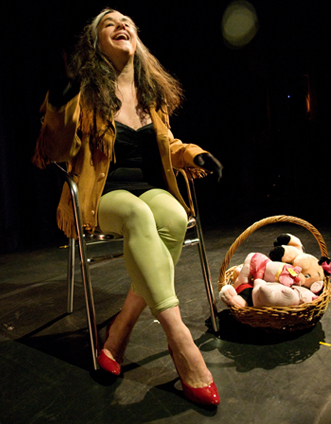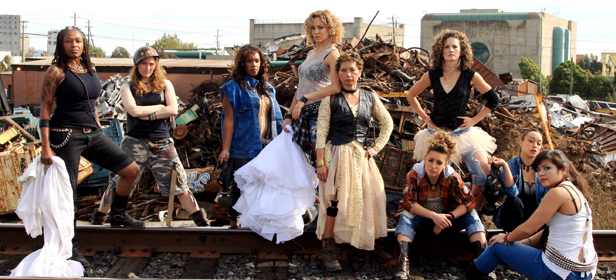Changing the Face of Dance around the Female Body
An interview with Krissy Keefer
BY EMMALY WIEDERHOLT
In 1984, Krissy Keefer and Nina Fichter founded Dance Brigade to create and perform dance-theater that addresses the complex problems of contemporary American women. Prior, Krissy co-founded the Wallflower Order in 1975 as the nation’s first feminist dance company. I had the honor of speaking with Krissy about the personal and national impact of her work.
~~
What was the genesis for Dance Brigade?
Dance Brigade started as the Wallflower Order Dance Collective, which started in 1975 in Eugene, Oregon. It was a women’s collective that toured all over the United States, Europe and Latin America for nine years. We had a political fight and broke up, and out of that Nina Fichter and I started Dance Brigade in San Francisco.
When the Wallflower Order broke up, Nina and I were on the same side, not necessarily ideologically but emotionally. We wanted to keep going; we weren’t done choreographing and making community work. So we started Dance Brigade.
Can you speak to the activist bent of Dance Brigade?
Wallflower was a women’s dance collective. We were probably the first dance company to respond to the large lesbian nation across the United States. Feminism and women’s power were the basis. We moved into much more diverse politics, including class and race. Dance Brigade was founded to continue that mission.
The women’s movement was definitely the foundation of our work. However, Wallflower toured extensively, whereas Dance Brigade has ‘stayed home.’ We decided to produce local events, including The Revolutionary Nutcracker Sweetie and Furious Feet Festival for Social Change. We really tried to integrate ourselves into the larger Bay Area.
What are some of your personal highlights?
Well it’s been a whole life. I was 22 when Wallflower started. I was able to manifest myself as an artist because of this national network of women production companies. We had a crossover aspect because we were good at what we did. I’ve been able to combine how I make a living with my politics. Not many people get to do that, especially artists. People tell me they have their politics, their art, and their job, but they’re not mixed. That’s been my personal highlight: my life.
What are the greatest challenges and hurdles you’ve faced?
Money. It’s the feeling that the amount of work I do doesn’t register with funders. That’s not just me though, that’s everybody. You have to fight for the money and resources every step of the way, and it gets exhausting.
Within a collective, there grows a lot of rancor and in-fighting. Wallflower had a big breakup which was very public, and that was painful.
You have to take the bitter with the delicious. I think about all the artists I’ve been able to collaborate with over the years. It’s a whole community of artists I can call my own.
When do you feel most successful? How do you measure success?
Success comes at different times in everybody’s career, and everybody has peak periods, and then they take breaks or are forced into breaks, and then they have peak periods again. Every individual has their standards about what makes a success.
Are you talking about being a successful choreographer? If you look closely, you see that most of the choreography jobs go to men. But if you don’t know that then you take it very personally and you say, ‘I’m not a good choreographer because I don’t get hired.’ But let’s be real: people take chances with men at any age, much more than they take with women.
Then there’s people who make brilliant work but don’t have any money to make their next piece because they don’t have a business model. They’re floundering financially all the time.
Then you have others who are very good at business and create an empire in order to support their work. There’s a gaze on them that says they’re successful, but they spend 75 percent of their time monitoring their building and business, so they see the independent artist as more successful.
So I guess you have to look at what influence you have. I base my success on my influence. I do feel like I’ve forged a path and brought a lot of people along. To me, that’s successful.
What difference do you perceive Dance Brigade has made?
I was at a panel discussion recently with Keith Hennessey and Sara Shelton Mann, and Keith actually contextualized us brilliantly. He said, ‘They changed the face of dance around the female body.’ Which we did.
We gave permission to a lot of artists with specific politics. We brought lesbianism into the modern dance world by name. All those things are transformative.
I’ve heard that Dance Brigade’s home – Dance Mission – is jeopardized. Is that true?
That’s the truth. We don’t have a lease, and the landlord is raising the rent every year. It’s not just about us though; it’s about the face of the Bay Area changing and who’s got access to the real estate. It’s not a new story, but it’s so overwhelming we’re all mind-boggled and reeling.
~~
Krissy Keefer co-founded Dance Brigade in 1984 with Nina Fichter, both original members of Wallflower Order. She developed a new kind of modern dance-theater that was stylistically rooted in martial arts, female athleticism and social justice issues. Dance Brigade resides in the heart of the Mission District in San Francisco at Dance Mission Theater, where they operate a 140-seat theater, dance studios, adult and youth classes, Grrrl Brigade and produce groundbreaking events.


